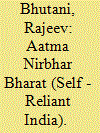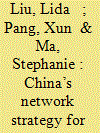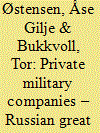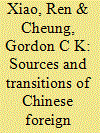|
|
|
Sort Order |
|
|
|
Items / Page
|
|
|
|
|
|
|
| Srl | Item |
| 1 |
ID:
176919


|
|
|
|
|
| Publication |
New Delhi, Pentagon Press, 2020.
|
| Description |
xvi, 198p.hbk
|
| Standard Number |
9789390095131
|
|
|
|
|
|
|
|
|
|
|
|
Copies: C:1/I:0,R:0,Q:0
Circulation
| Accession# | Call# | Current Location | Status | Policy | Location |
| 059970 | 338.54/BHU 059970 | Main | On Shelf | General | |
|
|
|
|
| 2 |
ID:
152312


|
|
|
|
|
| Summary/Abstract |
Existing scholarship on the rise of China and Chinese foreign policy has largely neglected to explain one puzzling phenomenon—although China’s network position in the global economic system has become more similar to that of developed countries, China continues to set its foreign policy from the perspective of a developing country. By analysing the relationship between the environmental possibilities and China’s intentional strategy, this article argues that the sharp contrast between China’s positions in the international political and economic systems reflects China’s ‘network strategy of embedded rise’. There are two mechanisms that go in opposite directions and jointly determine China’s foreign policy location in the international political spectrum. The first, called the ‘structural alienation effect’, is that wherein divergence in the centre-periphery positions in the global economic network increases the heterogeneity of two countries’ preferences, attitudes, and incentives, and in turn weakens alignment of their foreign policies. However, this structural effect is moderated by the second mechanism, namely, the ‘strategic affinity effect’. China’s strategy of assuming the role of a ‘broker’ to connect developing countries at the periphery of the international political and economic networks with developed countries at the centre achieves high ‘betweenness’ centrality, and so increases its social capital and influence in international politics. This article tests the proposed theory of China’s network strategy of embedded rise through hierarchical models that use global trade network centrality data and the United Nations General Assembly (UNGA) votes of 161 developing countries from 1994 to 2012. Our findings show that the globalized world both constrains and enables China’s great power status.
|
|
|
|
|
|
|
|
|
|
|
|
|
|
|
|
| 3 |
ID:
188318


|
|
|
|
|
| Summary/Abstract |
In a situation where the Russian national self-image and economic realities fail to add up, this article discusses whether Russian private military companies have become low-cost tools to restore Russian great power status. Our findings suggest that whenever these companies are used in a ‘power as outcome’ way, they appear less successful at adding great power status on the cheap and less useful at elite enrichment. In contrast, PMCs seem well suited to make power contributions, and for a low cost, in a ‘power as prestige’ way. In these settings they are also more suitable instruments for informal elite earnings.
|
|
|
|
|
|
|
|
|
|
|
|
|
|
|
|
| 4 |
ID:
141602


|
|
|
|
|
| Summary/Abstract |
Somewhere between the foreign visits and eloquent speeches, Prime Minister Narendra Modi managed to alter – albeit slightly – the narrative about India’s status in the international order. Thanks to the reach of social media and the internet generation, it is safe to say, that, India has managed to capture global attention. Will this attention grabbing strategy translate to changes on ground? Will India soar above its present status as a dominant power in South Asia to emerge as a Great power in the future? Can India take charge of the ‘Asian Century’?
|
|
|
|
|
|
|
|
|
|
|
|
|
|
|
|
| 5 |
ID:
172893


|
|
|
|
|
| Summary/Abstract |
At a time of technological and political change in the international security environment, Russia continues to view nuclear weapons as guarantors of peace and security among great powers. Nuclear weapons also assure Russia's own great-power status and mitigate uncertainty in an emerging multipolar order. In a world where the United States pursues improved missile defense capabilities and appears to reject mutual vulnerability as a stabilizing factor, Moscow views its modernized nuclear arsenal as essential to deter Washington from a possible attack on Russia or coercive threats against it. Some elites in Russia would like to preserve existing arms control arrangements or negotiate new ones to mitigate a weakening infrastructure of strategic stability. At the same time, however, they seem skeptical that the United States is willing to compromise or deal with Russia as an equal. Meanwhile, multilateral arms control appears to be too complex a proposition for the time being.
|
|
|
|
|
|
|
|
|
|
|
|
|
|
|
|
| 6 |
ID:
107176


|
|
|
|
|
| Publication |
2011.
|
| Summary/Abstract |
Chinese foreign policy has multiple sources, and the incentives that are driving its behaviour have grown from the domestic/international, as well as from regional, economic, normative, multilateral, and cultural levels. Foreign policy-making in China is becoming increasingly complex and sophisticated. This special issue is drawn from some edited papers presented in the joint workshop between Fudan and Durham Universities on Chinese foreign policy on 29-30 March 2010. By assessing the economic, domestic, regional, global and cultural sources of Chinese foreign policy, we aim to illustrate the various sources and to locate possible ways to consolidate the transitional process, and to spur future endeavour facing China's foreign policy.
|
|
|
|
|
|
|
|
|
|
|
|
|
|
|
|
|
|
|
|
|